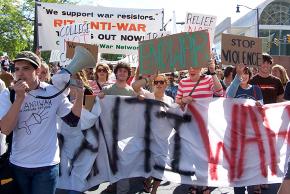Antiwar students look ahead
reports on a regional conference of the Campus Antiwar Network.
NEW YORK--The East Coast Campus Antiwar Network (CAN) conference, held at New York City's Hunter College on March 27-29, brought together some of the leading forces in the movement against war and occupation in Iraq, Afghanistan and Iraq, and organizing for justice for Palestinians through boycotts, divestment and sanctions of Israel.
Some 60 students attended the conference, which featured eyewitness accounts of the occupations in Iraq, Afghanistan and Palestine and provided a much-needed discussion on how to move our antiwar organizing forward.
Many key questions were raised during plenary meetings and an opening discussion featuring Anthony Arnove, author of Iraq: The Logic of Withdrawal. Among them: Is Pakistan next? How do we organize when the anti-Iraq war movement is in retreat? How do we explain that the wars in Iraq and Afghanistan are dependent on Israel's presence in the region? Can we draw in new activists in the Obama era? Can we take up budget cuts effectively in our antiwar work?

Workshops on budget cuts and building CAN chapters showed the importance of linking money diverted to occupation with inadequate funding of programs at home. The stark reality, which the budget cuts workshop can attest to by its attendance alone, is that the economic crisis has begun to hit many universities hard. Whether student fees are being raised or whole departments cut, many universities are adapting to harsh economic times with complete disregard for students.
CAN chapters presented various educational workshops on Pakistan, the immediate withdrawal from Afghanistan, the "war on terror" and the history of terrorism and Palestine. There was also a strategy session on working with veterans and organizing counter-recruitment activities.
Matthis Chiroux, a member of the Iraq Veterans Against the War and a war resister, spoke out against occupation and being a part of the military. Alaa Majeed, an Iraqi refugee and journalist, provided a chilling account of being a refugee and its toll on her children, and the occupation's impact on the people of Iraq. Raja Abdulhaq, a Palestinian City College activist, spoke about his homeland in a 20-minute crash course on the Israeli occupation, dispelling common myths about Palestinians, their resistance and Hamas.
A CAN activist from the University of Massachusetts-Amherst who spoke on the divestment strategies panel Sunday afternoon set the political mood for conference attendees to reinvigorate their chapters with the excitement and politics needed during this bumpy road to rebuilding an effective antiwar movement. Her unequivocal and unapologetic case for linking racism and genocide from Iraq to Palestine resonated in the applause that filled the auditorium.
Leaders from various campaigns--including a member of TakeBackNYU from New York University, a Students for a Democratic Society member from the University of Rochester, an International Socialist Organization member from Columbia University, a Students for Justice in Palestine activist from Hampshire College and a representative from Adalah-NY--shared their experiences and strategies. This kind of alliance of forces will be key to rebuilding the movement.


